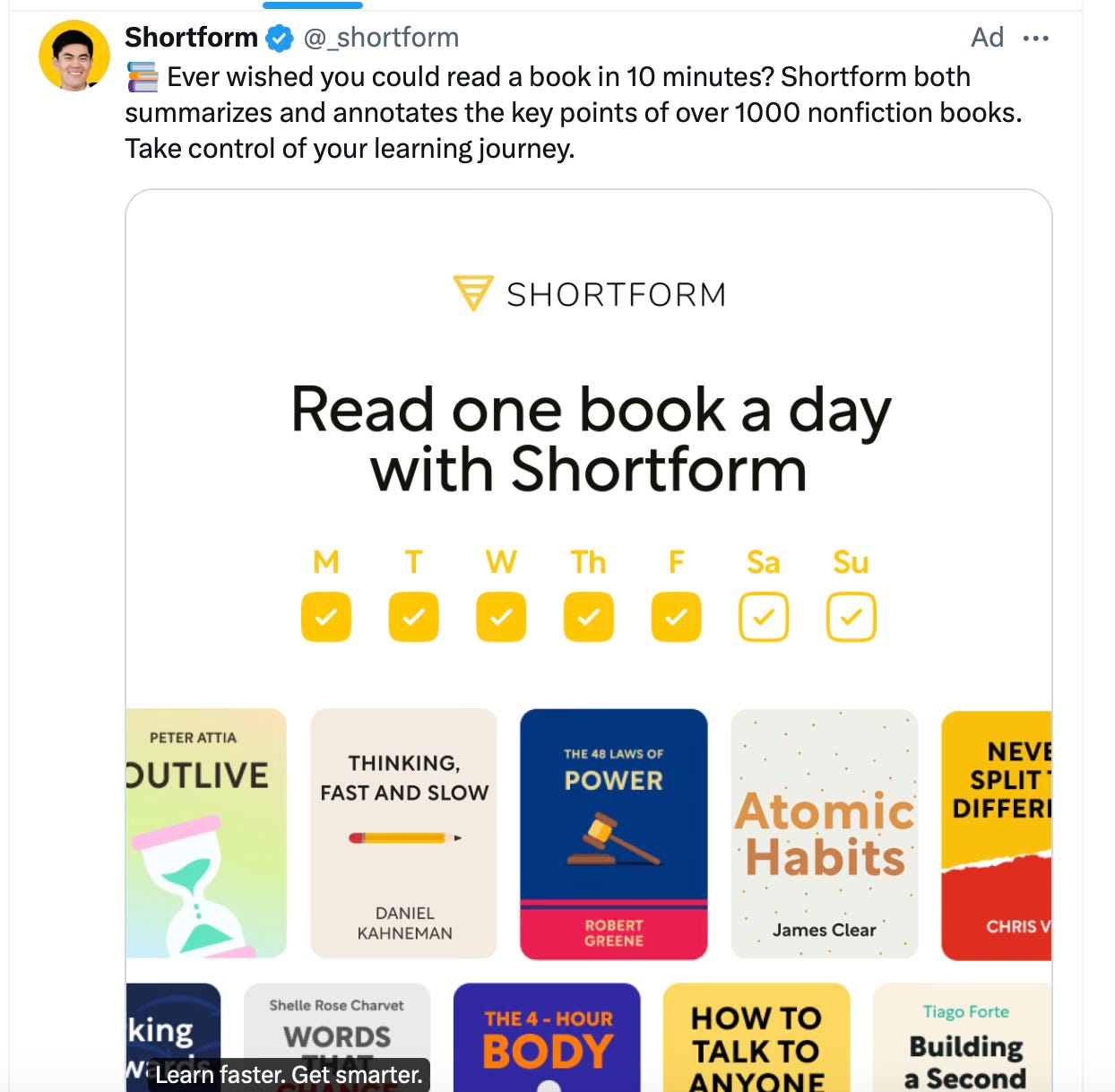As a Busy Executive, I Don't Have Time To Read..."
"Smart Brevity," speed-reading and other shortcuts that just aren't good enough.
You’ve probably encountered people who say they don’t have time to read books. Sometimes they say “novels,” but look at the add above, for a service offering synopses of self-help and business books that were created to be easily read. “Shortform” is not exactly offering study guides to Ulysses here and I wonder what the recently deceased Daniel Kahneman would think about people who can’t find a little time to just read Thinking, Fast and Slow.
The idea that people need Cliff’s Notes for popular books, as opposed to more difficult texts assigned in schools, is pretty depressing. But the people who claim to need such things aren’t embarrassed about it at all. They wear their inability to read entire books as a badge of honor, as if it is evidence that they are always needed by others. Why, you’d imagine jobs would be lost, nations would falter and orphans would starve if these very serious people took a little time for Dostoevsky.
The founders of Axios developed a whole theory of journalism and communications around the idea of “smart brevity,” which is based on the notion that busy business people don’t even have time to read a 1,500 word article, much less your email. Now, they’re pushing into artificial intelligence, as if in denial that human-to-human connection is the point of reading and writing.
It all recalls the 70s and 80s “speed reading” trend. Back then, multiple sources used newspapers and magazines to sell courses about how to read faster and retain information. Some of these involved ridiculous admonitions to read down the “middle” of the page, where the important words lie, or to scan text quickly to get surface impressions. It’s probably fine for Stephen Covey, but you’d be quickly lost in Finnegan’s Wake. Woody Allen summarized it best: “I took a speed-reading course and read War and Peace in twenty minutes. It involves Russia.”
The truth is, and all readers know this, that each pairing of book and reader demand different levels of time and attention. A long book can move quickly, a short book can take more time than you’d think. The reader has to decide what level of understanding they want to achieve. You can spend months with a book of haiku, even though each poem can be read aloud in a breath.
Whether a book is fiction, nonfiction or some combination, the writing exists to create connections between reader and author and between the reader and the author’s characters or arguments. A book is not, as so many tech people mistakenly believe, a piece of technology used for storing and transmitting information. Writing is not computer code, meant to use the most efficient means to produce a repeatable result. Writing is an attempt at forming connections and relationships, which is extremely personal and not reducible to science.
You can know what a book is about without ever having read it. I know what Moby Dick is about. But I have no connection to it because I have not done the work and no Wikipedia summary, however good, can do that work for me. People who read only summaries have a summary understanding of the world around them. Honestly, that might be good enough for everyday life. Professionally, politically and socially, I am sure we have all run into circumstances where having a fairly deep knowledge of a subject doesn’t mean that consequential people want your point of view. Reading deeply about current events might satisfy my curiosity but it doesn’t make the Biden Administration (or any the executive at work) want to hear from me about it.
But being able to get by with a cursory knowledge of things doesn’t mean that skating by is the best strategy. You never know when deep understanding will separate you from others or create an opportunity for you to do good things. Sometimes, it pays to read the whole book.
Film director John Waters says that if you go home with somebody and they have no books, that you shouldn’t sleep with them. I’ll say, at least, if somebody tells you that they don’t have time to read that you should not be impressed with their importance. They are not telling you how busy they are, but that they are lazy and incurious.
Reading isn’t just fundamental. It’s fun.



Reading is a gift you give yourself. It’s essential to my life.